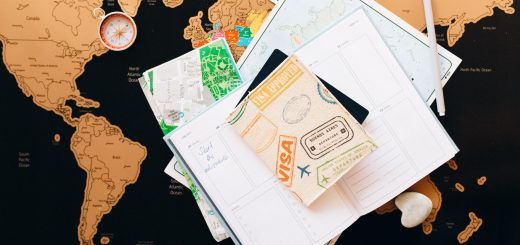Digital Nomads Visa Options: A Guide to Countries Welcoming Remote Workers
Many countries offer visas for digital nomads; deciding which ones are right for you can take time.
In this blog post, we’ll look at some of the best countries for digital nomads and explain why they are great places to live and work.
What Is a Digital Nomad Visa?

A digital nomad visas allow individuals to work remotely in a foreign country. The program is designed for self-employed individuals or those who work for a company that allows remote work. For a set period, usually several months, the visa holder can work from home while enjoying all the benefits of living abroad. Digital nomads, freelancers, and entrepreneurs seeking to experience different cultures and ways of life are increasingly using this type of Visa.
Criteria for obtaining a digital nomad visa
Globally, digital nomad programs are becoming increasingly popular. To qualify for this type of Visa, applicants must typically meet the following requirements:
- Have to be 18 years old or older
- Maintain a stable monthly income, which varies by country
- Perform a job remotely from anywhere.
18 countries where digital nomads can get a visa
Here are the countries that offer visas for digital nomads
- Georgia
- Estonia
- Germany
- Portugal
- Spain
- Romania
- Albania
- Barbados
- Bermuda
- Anguilla
- Dominica
- Grenada
- Mexico
- Brazil
- Malaysia
- Dubai (UAE)
- Taiwan
- Thailand
Here are the explanations for each country:
Georgia

Georgia offers a welcoming environment for remote workers, making it an ideal destination for digital nomads. Georgia stands out among other countries in terms of ease of access by allowing citizens of 95 countries to enter visa-free and stay for up to 365 days.
Despite not having a specific digital nomad visa, the country allows remote work while in residence. Applicants must prove that they earn $2,000 per month or have a bank statement showing $24,000. A 20% medium income tax rate applies to those who work in the country for more than 183 days. However, individual entrepreneurs tax only 1% on their business turnover up to $155,000 in Georgia. Freelancers and digital nomads can benefit from this scheme, leading to permanent residency.
Georgia has a friendly visa policy and a low cost of living, ranking 84 out of 140 countries on the Numbeo cost of living index. Tbilisi offers a unique blend of history and culture with the Caucasus mountains and black sea coast nearby. Additionally, the country is known for its delicious food and wine culture. A wide range of options for living and working make Georgia a top choice for digital nomads due to its fast internet speeds (fixed: 29.58 Mbps, mobile: 43.77 Mbps).
Estonia

With the help of digital signatures, Estonia’s e-residency program enabled foreign entrepreneurs to conduct their EU-based businesses more efficiently. A one-year digital nomad and freelancer visa was introduced in June 2020, making it the first country to offer an official digital nomad visa. The program costs €80 for short stays and €100 for long stays, with a validity period of one year. Applicants must prove an income of €3,504 to qualify. There are 101.53 Mbps for fixed connections and 98.35 Mbps for mobile connections in Estonia, ranking 43 out of 140 in terms of the cost of living index.
Germany

Basically, the freelance visa in Germany called the Aufenthaltserlaubnis für selbständige Tätigkeit. The permit allows foreign freelancers and self-employed individuals to reside in Germany for three years. In German bureaucracy, approval can take up to four months. There is a fee of €100 for the VisaVisa. Permits range from 6 months to 3 years, and applicants must demonstrate self-sustainability and have a German address. In Germany, the cost of living ranked 30 out of 140, at 62.9. Mobile data speeds in Germany are 109.08 Mbps, and fixed speeds are 152.97 Mbps.
Portugal

Portugal offers a great opportunity for digital nomads with its D7 VisaVisa, which allows for a stay of up to one year, renewable for up to five years. After five years, permanent residency is possible. Lisbon and Porto offer vibrant cultures and lifestyles, while the Algarve, Madeira, and Azores offer beautiful beaches.
Portugal also introduced a digital nomad visa in October 2022, which requires less paperwork than the D7 VisaVisa but does not provide permanent residency. It costs €83 for the VisaVisa and €72 for the resident permit and requires an income of €600 per month.
The cost of the Digital Nomad Visa is unknown yet, but it requires €3000 per month (four times the minimum wage in Portugal) and lasts for one year. The cost of living in Portugal is 45.3 (66 out of 140), and internet speeds are 200.01 Mbps for fixed and 143.05 Mbps for mobile.
Spain

The Non-Lucrative Visa is available to self-sufficient or retired individuals who cannot work under this VisaVisa. It has become increasingly difficult to enforce this rule with the rise of remote work. A draft bill called the Startups Law is also being introduced in Spain to create a Digital Nomad Visa. In January 2023, the proposed law will allow remote workers to stay and work in Spain for 12 months, with the option of extending their stay for another 48 months. If the VisaVisa is granted, earnings over €600,000 will be taxed at 15%.
Spain is a popular holiday destination for location-independent individuals due to its low cost of living, stunning beaches, mountains, and vibrant cities. There is also rapid growth in the tech scene in Barcelona.
An annual Non-Lucrative VisaVisa costs $140 and can be extended for another year. Applicants must prove a monthly income of €2,151 to be considered for the program. The Start-Up Visa does not have a cost or specific details, but it is expected to have a duration of one year and a maximum of five years with an income of €2,000 a month.
Spain’s cost of living index is 50.6 (53 out of 140), and the internet speed is fixed at 239.23 Mbps and mobile at 78.78 Mbps.
Romania

Romania has been recognized as having the fastest fixed internet speed in the EU. Romania has approved a 12-month visa for digital nomads, which can be renewed for an additional year. Romania may find it hard to attract digital nomads due to its higher monthly income requirements than Croatia, which requires a monthly income of €2,232. It is unknown how much the VisaVisa will cost and what the cost of living index will be in Romania. The fixed internet speed in Romania is 260.24 Mbps, while the mobile internet speed is 74.40 Mbps.
Albania

With the implementation of a new law at the beginning of the summer, Albania has made it easier for digital nomads and pensioners to obtain residency permits. As a result, only one permit is required instead of two previously. There is an option to extend the Albania Digital Nomad Visa by another year, then by five years. After seven years, a permanent residency application can be filed.
There is no information on the cost of the VisaVisa at this time. This VisaVisa is valid for 12 months, renewable for another 12 months, and then for five years. Income must be sufficient to prove eligibility. Albania’s cost of living index is 37.4, ranking 90 out of 140 countries. Mobile connections average 54.08 Mbps and fixed connections 66.60 Mbps.
Barbados

With the Barbados Welcome Stamp, Barbados offers digital nomads a chance to experience island life on a Caribbean island. The country is well-connected to other Caribbean and Central American destinations, subject to any travel restrictions.
Barbados may not be the most affordable option, but it is still cheaper than other Caribbean countries offering remote working visas. Furthermore, Barbados has some of the fastest internet speeds in the Caribbean. An individual can participate in the program for $2,000, or a couple/family can participate for $3,000 annually. Barbados has a cost of living index of 88.8 (5 out of 140) and an internet speed of 124.92 Mbps. Participants must prove an annual income of $50,000.
Bermuda

The Work From Bermuda visa program has been established in Bermuda, with a relatively low application fee and no salary requirement. It is important to note that Bermuda is considered one of the most expensive countries to live in. It may appeal more to those with higher financial means, like the Cayman Islands, although this needs to be explicitly advertised.
An annual fee of $263 is charged for the program. With Bermuda’s high cost of living index of 141.8 (out of 140), applicants must demonstrate their ability to support themselves financially. With a fixed speed of 73.6 Mbps, Bermuda’s internet speed is also relatively fast.
Anguilla

The Work From Bermuda visa program was established in Bermuda with a relatively low application fee and no salary requirement. Regarding the cost of living, Bermuda is considered one of the most expensive countries. It may be more attractive to those with higher financial means, like the Cayman Islands, although this needs to be explicitly stated.
There is a $263 fee for the program, valid for one year. Due to Bermuda’s high cost of living index of 141.8 (out of 140), applicants must demonstrate financial stability. Bermuda’s internet speed is also relatively fast, with a fixed speed of 73.6 Mbps
Dominica

The Caribbean island of Dominica, nestled between Guadeloupe and Martinique, has introduced WIN Work In Nature, a program designed for digital nomads. Up to 18 months can be spent living on the tropical volcanic island, known for its hot springs. Furthermore, children can attend private or state-run schools and receive an income tax break.
Dominica is a wonderful destination for digital nomads due to its low cost of living. For a single person or family, the program fee is $800 or $1200. It costs about the same as Canada, ranking 25 out of 140 for the cost of living. There is a fixed internet speed of 109.05 Mbps.
Grenada

The “spice island” Grenada has officially launched its digital nomad visa. Visas are valid for one year and can be renewed for one more year. This VisaVisa offers the opportunity to take advantage of Grenada’s zero-income tax policy.
An individual visa costs $1,500, a family visa costs $2,000, and each additional dependent costs $200. Initially, the VisaVisa is valid for 12 months but may be extended for another 12 months. Proof of an annual income of $37,000 is required of applicants. Grenada’s cost of living index and internet speed is unknown. However, the internet speed is fixed at 93.30 Mbps.
Mexico

Mexico offers a unique blend of beaches, Mayan and Colonial culture, diverse landscapes, the bustling capital city of Mexico City, and delicious cuisine. It offers a 6-month tourist visa and relatively low living costs. Further, you can extend your stay for an additional three years with a Temporary Resident Visa.
There is a fee of $190 to $390 for the VisaVisa, including the interview. The VisaVisa requires $27,000 in the bank account balance or $1,620 in monthly income. It ranks 92 out of 140 in the Numbeo Cost of Living Index at 37.3. Mobile speeds here are also quite good, averaging 34.63 Mbps.
Brazil

The Brazilian government announced on January 24th, 2022, that it would offer a visa for digital nomads. The temporary VisaVisa will allow digital nomads to stay in Brazil for one year, possibly renewing it for another year.
Applicants must demonstrate a minimum monthly income of $1,500 to qualify for the VisaVisa. It is necessary to apply at a Brazilian embassy, and the cost of the VisaVisa is unknown. According to the index, Brazil ranks 34.7 out of 140 in terms of cost of living. It offers an average internet speed of 166.24 Mbps for fixed connections and 113.61 Mbps for mobile connections.
Malaysia

De Rantau Nomad Pass opens Malaysia’s doors to digital nomads just south of Thailand. Starting October 1st, 2022, this digital nomad visa will be valid for a year with the option to extend. A minimum income requirement of just $2,000 per month is required to apply for the program, which aims to establish digital nomad communities with tailored products and services.
In addition to the $220 visa fee, spouses and dependents must pay an additional $110. Malaysia’s cost of living index is 35.0 (ranking 101 out of 140), and applicants must have an annual income of $24,000 to apply. Malaysia’s internet speed is 134.40 Mbps for fixed connections and 56.84 Mbps for mobile connections.
Dubai (UAE)

For one year, Dubai has launched a virtual working program for remote workers and digital nomads. It allows individuals to work remotely in the bustling megacity for a year while also taking advantage of the city’s zero-income tax. The program is open to individuals from abroad and within Dubai, but a Dubai visa may be required for entry.
Visas cost $287 in Dubai. Applicants must have a minimum income of €5,000 per month (over the last three months) and provide proof of employment or ownership. Generally, Dubai’s cost of living is higher than the UAE’s, with an index of 60.3 (36 out of 140). In addition, mobile speeds in the city are 316.10 Mbps, and fixed speeds are 224.14 Mbps.
Taiwan

It does not have a specific program aimed at Digital Nomads, but it has the Gold Card program, an open-end work permit, and VisaVisa. To qualify for the Gold Card, applicants must have a monthly income of 160k TWD (USD 5700) or possess high-level skills like being a lawyer. Visas cost $100 to $310, depending on nationality and duration. Taiwan’s cost of living is relatively low, with an index of 54.2 (45 out of 140), and the internet speed is excellent, with fixed speeds of 189.97 Mbps and mobile speeds of 133.43 Mbps.
Thailand

Thai cities like Chiang Mai and Bangkok offer low living costs and fast internet speeds, making them a popular destination for digital nomads. Most nomads, however, rely on the 60-day tourist visa, which can be extended for 30 days before a visa run is required. Thailand has introduced the Long Term Residency (LTR) Visa for wealthy ex-pats, investors, retirees, and digital nomads.
To qualify for this 10-year VisaVisa, you must have a combined revenue of $150 million in the past three years and have a minimum income of $80,000. Most digital nomads will likely be discouraged by these requirements.
In conclusion,
A growing number of countries offer visas to digital nomads. Remote workers and entrepreneurs who wish to live and work in a foreign country for an extended period are eligible for these visas. However, it is important to note that requirements and qualifications for these visas can differ greatly from country to country. Several countries, including Indonesia, have specialized visa programs for digital nomads and wealthy individuals, while others may require proof of income or professional qualifications. You should compare and research the options available for the best fit.
FAQs
How long can I stay in the country with a digital nomad visa?
Digital nomad visas allow you to stay in a country for varying periods. Some countries, such as Estonia, allow you to stay for 365 days, while others may have a shorter stay limit. You should check each country’s requirements to see how long their visas last.
Does a digital nomad visa allow me to bring my family?
Depending on the country, this also varies. You can bring your family to some countries, such as Barbados and Mexico, but not others. Check the requirements of each country to see if family members can accompany a digital nomad visa holder.
What are the tax implications of working as a digital nomad abroad?
Working as a digital nomad in a foreign country can have tax implications. Before working in a new country, you should understand its tax laws and regulations. Depending on the circumstances, you may have to pay taxes both in your home country and in the country where you are working.



